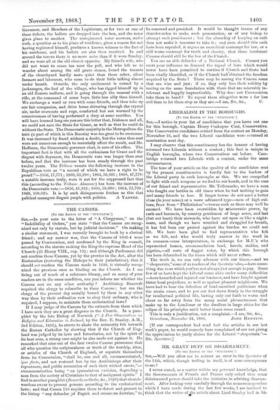THE CANONS.
[TO THE EDITOR OF THE " SPECTATOR:1
Sin,—In your note to the letter of " A Clergyman," on the "Indelibility of Orders," you state "that the Canons are recog- nized not only by statute, but by judicial decisions." On making a similar statement, I was recently brought to book by a clerical friend ; and my answer was, that the Canons of 1603-4 were passed by Convocation, and confirmed by the King in council, according to the statute making the King the supreme Head of the Church (25 Henry VIII., cap. 19) ; and although Parliament did not confirm these Canons, yet by the proviso in the Act, after the Restoration (restoring the Bishops to their jurisdiction), that it should not confirm the Canons made in 1640, it virtually recog- nized the previous ones as binding on the Church. As I am living out of reach of a reference library, and as many of your readers are in the same condition, can you inform me whether the Canons rest on any other authority ? Archbishop Bancroft required the clergy to subscribe to these Canons ; but are the clergy of the present day morally bound by them in any other way than by their ordination vow to obey their ordinary, who is required, I suppose, to maintain these ecclesiastical laws?
If I may judge of the Canons by the extracts from them which I have seen they are a great disgrace to the Church. In a pam- phlet by the late Bishop of Norwich ("A Few Observations on Religion and Education in Ireland, by the Rev. E. Stanley, A.M., 3rd Edition, 1836), be strove to abate the animosity felt towards the Roman Catholics by showing that if the Church of Eng- land was judged by its laws and formularies, not by the spirit of its best sons, a strong case might be also made out against it. He remarked that nine out of the first twelve Canons pronounce that all who question the scripturalness or truth of the worship, rites, or articles of the Church of England, or separate themselves from its Communion, "shall be, one and all, excommunicated, ipso facto, and not restored but by the Archbishops after their repentance, and public revocation of such their wicked errors,"— excommunication being "an ignominious excision, degrading a man from the society of Christians to that of malignant spirits." I find in another pamphlet (Remarks on Oaths, &c., 1826) that church- wardens swear to present persons according to the ecclesiastical laws; and that Canon 110 requires them to detect and present to the bishop " any defender of Popish and erroneous doctrine," to
be censured and punished. It would be thought insane of any churchwarden to make such presentation, or of any bishop to attempt such punishment ; but the absurdity of keeping an oath does not make it innocent to take it ; and even should this oath have been repealed, it argues an anarchical contempt for law, or a still worse contempt for truth and charity, that these intolerant Canons should still be the law of the Church.
You are an able defender of a National Church. Cannot you exert your influence to demand the repeal of laws which would never have been permitted to survive if Church and State had been vitally identified, or if the Church had obtained the freedom acquired by the State ? There may be among the Canons some that are wise and just; if so, they only lose their validity by resting on the same foundation with those that are miserably in- tolerant and happily impracticable. Why doe; not Convocation take them in hand ? To repeal them altogether were a far less
evil than to let them stop as they are.—I am, Sir, &c., C.






































 Previous page
Previous page